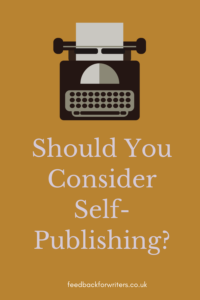 For many writers, the idea of self-publishing at all fills them with horror. “Oh, no, no, no,” they’ll say, aghast. “I only want to be PROPERLY published.” Which, in many circumstances, when you’re a writer of literary fiction novels especially, is absolutely the right approach.
For many writers, the idea of self-publishing at all fills them with horror. “Oh, no, no, no,” they’ll say, aghast. “I only want to be PROPERLY published.” Which, in many circumstances, when you’re a writer of literary fiction novels especially, is absolutely the right approach.
But having experimented myself (and succeeded, generating myself a regular, if small, income from a non-fiction series based on a blog I run), and knowing what I do from experience in both traditional publishing and on self-publishing platforms, I know that the answer to the question “Should I consider self-publishing?” is actually: Sometimes
What Does It Depend On?
Whether you should or not depends on three main factors:
- What you’re writing
- Who you are
- What you want
There are many circumstances where the traditional publishing route—agent, traditional publisher, bookstores— is absolutely the best and only one to give serious consideration to. There are others where I think if you’re NOT considering self-publishing and are still hopefully clinging to the traditional pathway, you’re missing a trick (and the chance to make yourself some money). There are times, too, where the jury is out: where it totally depends on what you are after and what your personal circumstances are.
Below is my quick guide to when self-publishing should definitely be considered as an option—and when it’s likely not going to be for you at all. So:
YES. Self-publishing is well worth considering if…
1. You Mainly Want To Produce E-Books Rather Than Print
No, not everything has to be produced in print form. Print books and pamphlets are relatively costly to produce, even print-on-demand, which is one of the reasons short fiction authors and poets in particular have a hard time getting publishing deals.
But e-books can be widely distributed to multiple channels at very little cost to yourself. I currently have non-fiction e-books distributed to Kindle, Apple Books, Barnes & Noble, Kobo, Scribd and a number of others, as well as as downloads on my own website. Plenty of people no longer read print books. (If you publish with Amazon, you can also get the option to offer e-books in paperback format via Amazon’s print on demand service, although they are a lot less profitable.)
Some examples of where JUST an e-book might be a legitimate option:
- Informational & How-To Books
- Books based primarily on blog content
- A well-advertised collective or experimental short fiction or other anthology
2. You Are Publishing Non-Fiction, ESPECIALLY How-To Books
Now, I usually prefer to buy my fiction books in print (although as a e-book reader and highly impatient person, I sometimes can’t wait and download fiction e-books onto my e-reader and THEN purchase the print copy if it’s something I want to keep).
But I honestly can’t remember the last time I bought a non-literary non-fiction book in print form. And yes, that includes writing How-To books. Usually, it’s because if I want some information, I want it NOW, and what’s the easiest way to get it right away? After Googling, I mean?
Get an e-version. 2 minutes and it’s in your hands. And what I care about is what the information is and if it gives me what I want, not whether it was published by Mr Big Name Publisher.
Think on. Especially if you’ve something to teach (so yes, this does include writers of all types) and your knowledge is already respected or sought after in some way.
3. You Already Have a Platform & Are Known
One of the big advantages of the traditional publishing route is that once you are accepted, the marketing work is, at least in theory, done for you (and paid for) by the publisher. Sure, you’ll be expected to involve yourself in publicity and do a lot of work yourself, readings, interviews, appearances, social media etc. But the whole point of that is to generate your author platform for you and to basically tell the world, “This person is legit.”
But what if you’ve already got a platform, generated by your own efforts? What if you already are a known person, author or authority on something? What if your blog already gets loads of traffic, or you’re a familiar, respected face on whatever circuit you’re in? You ALREADY have reach. Do you need the legitimacy of a “known” publisher to get your book out there? You have an audience. You’ve already demonstrated your legitimacy. You may even have fans. Why let someone else take a cut for something you are already doing yourself when you can bring it direct to your audience yourself?
4. You Publish Genre Fiction and LOTS of it.
I’m not talking about sensitive literary whimsy here, or the novel that wins the Booker. The self-publishing route is DEFINITELY not for those, unless you are already a big name . No, I’m talking hard-boiled genre. Horror, Thriller, Mystery, Romance, those kinds of things.
Of course, trends come and go as far as genre is concerned, so you need to be prepared and realistic.. I’m also talking situations where you produce a lot of books so not a once-every-two-years kind of effort. Series, for example, even story collections (although these are less popular). And you WILL still need to create a platform for it, and it’s hard work and competitive. But plenty of people read genre fiction and a lot of it, and, yes, a lot of it is also sold in e-format rather than print.
5. You Have Experience in Publishing, Editorial and/or Design
To be fair, you don’t actually need a lot, especially if you’re only publishing ebooks, but be aware that if you don’t have these experience or skills, you may well have to pay someone who does. I’m lucky enough to have had many years of experience in publishing and book production. I’ve certainly found it helps, and managed to produce all my ebooks to a good quality without spending anything. Otherwise, your main production outlays would most likely be on:
- Editorial (copyediting, proofreading)
- Cover design and creation
But it isn’t difficult these days, for instance, to find free programmes (such as Canva) to design beautiful professional-looking covers for e-books, although the file quality is not usually not adequate for print. If you are publishing ebooks and using either Amazon KDP or an aggregator (such as my favourite, Draft2Digital or Smashwords), you also don’t need typesetting or layout skills or anything more than an understanding of formatting in Word; ebooks produced through these systems work best when you upload a Word file and let the system format it for you. Editorial and proofreading skills, particularly for fiction, are a must, however, and if you don’t have them, you will need to pay for them.
NO. The traditional route is better than self-publishing if…
1. You Want Your Books To Appear In Traditional Bookshops
Even if you do produce print versions of your books, self-published books are not going to be appearing in your local Waterstones or independent bookshop. Ever. They’re just not. Bookshops buy from publishers, not self-publishers. So if you have dreams of your masterpiece appearing in the window of your favourite bookshop, or being discovered by someone browsing the bookshelves, self-publishing is not for you (or this piece of work, in any case).
2. You’re ONLY Writing Literary Fiction, Especially Novels
Self-publishing success is generally directed by popular interest. The more popular, the better, the more interest you’re likely to generate, and the more sales you are likely to make. In a nutshell, self-publishing success tends to be more about quantity and popularity than quality per se. And you’ll be doing your own marketing.
This is why things like genre fiction and how-to books (and books by known writers) sell . A much broader range of people are going to be interested in them than will be in literary fiction, particularly by unknown authors with no platform. You need a publisher, a known publisher, to have success with literary fiction. For most literary fiction readers, the publisher IS part of a guarantee of quality. You wont get anywhere without it.
3. Literary Kudos Is Important To Your Fiction Success
Connected to the above. Literary fiction success means reviews, bookshops, prizes. It is all about quality and receiving critical respect and kudos for the work that you do. This means where and how your work appears is important.
If kudos for the brilliance of your work is your ultimate aim, especially if you’re in the early stages of your career or previously unpublished, then the traditional publishing route is for you. The much-maligned “gatekeeping”, I’m afraid, is there for a reason.
4. You Don’t Want To Work With Amazon or Produce E-Books
Understandably, many writers feel uncomfortable working with Amazon these days for ethical reasons. Amazon Kindle of course, is not the only e-book provider and there are plenty of other platforms you can publish on, but it IS one of the biggest markets. Additionally, it offers a print-on-demand service, meaning that you can offer customers paperback versions of any e-book you publish (printing a single copy and sending direct to customers, no warehousing required). Sadly, most of the aggregator services don’t offer print.
If you’re wedded to print, self-publishing may not be not the best route for you. You would have to pay for all the printing yourself as well as do all and any marketing, and you won’t get self-published books into bookshops in any case. In the traditional route, this is all handled and paid for by the publisher. Vanity publishers, of course, will charge you for the privilege. I wouldn’t even consider going down that route.
E-books are the single easiest way of self-publishing and doing so cheaply, at least at first, when you are testing the water. Print is costly, and no-one wants piles of unsold books lying around at home.
5. You Don’t Have A Platform Already, & Aren’t Ready To Create One
It’s going to be hard to sell books if you don’t have a platform or aren’t drumming up interest. I only started self-publishing AFTER my blog (not this one) was getting a lot of traction and traffic independently. Again, although publishers are interested in authors who already have platforms, if your work is accepted by a publisher, it will be they who helps with your platform and with marketing your book
6. You Don’t Have Access To Editing Services
Traditional publishers, of course, will edit your work thoroughly in-house; this ensures a quality product. If you don’t go the traditional route, then unless you are an exceptional editor, bear in mind that you will usually need to pay for this yourself or at least find someone who can help you with it. One of the biggest complaints about self-published books is poor quality editing and “no wonder no proper publisher took this on,” so it’s essential that your book does not fall into that category.
Decided To Explore Further?
For those who’ve decided self-publishing MIGHT be worth exploring, I’m putting together a practical guide to the ins and outs of this route. It will be available here soon.
In the meantime, take a look at some of my Writing Tips
Want feedback on your writing? Check out the feedback service I offer here.
